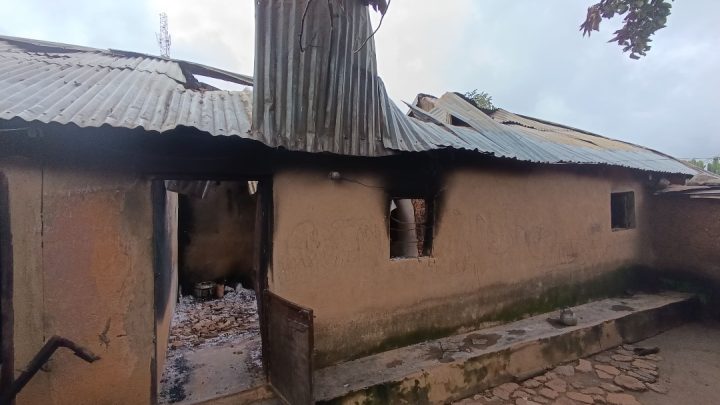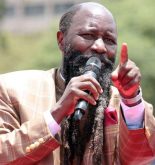By Middle Belt Times Investigative Team
After the bullets stopped and the flames died down, Bindi was left with 27 graves, empty homes, and fathers mourning where children once played.
A Community Under Siege
The sun rose above Bindi village, but it brought only light and sadness. Rev. Davou Musa’s home, which once filled with children’s laughter and evening prayers, stood empty in this quiet Christian farming community. The walls of the house are destroyed and the roof has collapsed. The floor where families used to kneel to pray was now covered with ashes. This was no accident. It was a war waged at night.
The sharp sting of smoke remains in the air, along with something heavier: fear, sorrow, and the kind of grief that clings to the skin. The farms that once promised food are now abandoned, with crops left to wither. It seems nobody will harvest this year.
When Middle Belt Times (MBT) arrived on July 21, Bindi felt like it was no longer breathing. The women and children had fled after the devastating attack that claimed 27 lives. What remained is a ghost town with mud houses and shattered dreams along the Jos-Abuja highway. The few men around were silent and alert. Their eyes were dulled from sleepless nights and devastating loss. Bindi is located 30 miles from Jos capital city.
You can also read – How Fulani Militias Became Nigeria’s Deadliest Group While Escaping Global Notice
A Community’s Peaceful Existence Shattered
Bindi Tahoss community, home to approximately 1,000 residents living in 160 mud houses—some crowned with traditional thatch roofs—had been a picture of rural quietness. The temperate climate, reminiscent of European cities, created ideal conditions for diverse vegetable cultivation, sustaining a population of subsistence farmers who had coexisted peacefully with their neighbours for generations.
“We have never had any misunderstanding with the Fulani,” Simon Davou told MBT, his voice carrying the bewilderment of a man whose world had been turned upside down without warning.
“They graze around our community, but we have never had any reason to disagree with them over the years. Sometimes they graze into our farmlands and destroy our crops, but that is a reality we have learned to live with over the years.”
The community’s only protection came from an unusual source—cactus walls encircling the small settlement. “These cactus plants are our only form of security,” Rev. Davou Musa explained to MBT, gesturing toward the thorny barriers that had proven tragically inadequate against the coordinated assault that would follow.
Simon Davou’s words reveal the resigned acceptance of a vulnerable community: “There are times they attack our people in their farms, but what can we possibly do? We are a small community of about 160 houses. There is no police station or any security agency stationed here, so we overlook most of these issues by the Fulani herdsmen.”
The Calm Before the Storm: July 14 Warning Signs
The sequence of events that led to the massacre began on July 14, when women and children working their farms spotted an unusual gathering. Large numbers of Fulani herders were accompanied by unidentified men dressed in black clothing. It was a sight that immediately triggered alarm bells in the peaceful community.
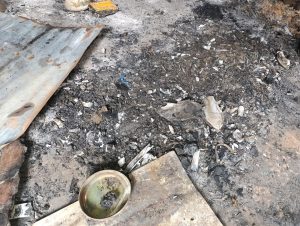
A point where the explosion was triggered by Fulani herders
“The women screamed to draw attention from members of the community, whistles were blown across the community, and the herdsmen fled,” Rev. Musa recounted to MBT.
“When they fled, we all thought they had gone, but by 4 pm, they returned, and the information went around our community that there was a threat in the community, and they were identified as Fulani from Hayin Bangai, a community about a mile from our community. You can see the community from here, over there.”
You can also read – Buhari’s Death and the Body Double Theory
Google Maps showed Bangai’s proximity as less than a mile south of Bindi. More significantly, MBT investigations revealed that a prominent leader of the Miyetti Allah Cattle Breeders Association of Nigeria (MACBAN) lives in Bangai of Bachit District, raising questions about MACBAN’s possible role in the attack on residents of Bindi.
The community’s response to the threat was swift and followed proper channels. “On that evening of July 14, we tried and informed the security about the movements of people that we don’t understand in our community,” Rev. Musa explained.
“We called our Ward councillor, who then called the guard commander of the Nigerian Army immediately. The commander sent some soldiers at about 5 pm with two gun trucks. We were all happy and confident since we saw the Army in our community, and we went about our activities.”
The Army’s Brief Presence Hours before Attack
The arrival of Nigerian Army personnel brought temporary relief to Bindi residents. The sight of the two gun trucks and soldiers patrolling their community provided a sense of security that would later turn devastatingly false. At 7 pm on July 14, the first signs of trouble emerged.
“At about 7 pm, we began to hear gunshots from the major road that passed through our community,” Rev. Musa recalled. “It was from the armed Fulani herdsmen. Then we also heard a response from the soldiers, and we felt better because the soldiers responded to the gunfire from the herdsmen.
“Then the gunfire ceased, and everywhere became quiet. We went to bed trusting that the soldiers would be on the ground to forestall any further threat that may arise, but we were wrong.”
Assault at dawn
At 3 am on July 15, the nightmare began in earnest. “We started hearing gunshots again. This time, there was no response,” Rev. Musa told MBT. “It was just the herdsmen shooting sporadically. They cut down some cactus fence and came into our community through the direction of Bangai.”
Ezekiel Yakubu, the youth leader of Bindi, provided additional context to MBT: “They came in from Hayin Bangai to attack our village. They had in the past accused our community of killing a young herder, an accusation they couldn’t prove.
The government knows the people carrying out these attacks against us and must be decisive. Go into Bangai and ensure that the arms are recovered from the herdsmen and the perpetrators of this atrocity are brought to book.”
Attack on the Community’s Identity and Faith
Among the most disturbing aspects of the assault was the deliberate targeting of the community’s spiritual centre. The Church of Christ in Nations (COCIN), the only church in Bindi and the spiritual heart of this Christian community, was systematically vandalised during the attack.
Windows were shattered, chairs were broken, and the public address system and other musical instruments were destroyed. It looked like a calculated assault on the community’s faith and identity.
Rev. Davou Musa, who serves as the resident pastor of the COCIN church, witnessed firsthand how the attackers sought to destroy not just lives and property, but the very soul of the community.
The targeting of religious infrastructure alongside residential homes suggests a coordinated effort to drive the Christian population from their ancestral lands permanently.
Sophisticated Weapons and Tactics
Investigations by Middle Belt Times revealed the chilling sophistication of the attack. Eighteen houses sheltering 27 families were levelled with explosives suspected to be calcium carbide, a highly reactive substance that ignites on contact with moisture, water, or sparks.
Using such dangerous material points to careful planning and access to resources, far beyond the reach of ordinary, spur-of-the-moment violence.
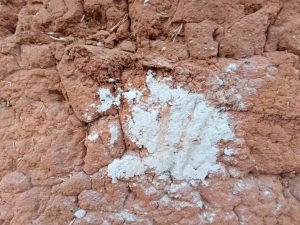
The remaining calcium carbide used during the invasion
The explosions left more than just rubble. They tore apart homes and lives. Roofs were ripped off, walls crumbled, and furniture lay buried beneath ashes and sand. It was clear that the attackers came not just to scare, but to destroy everything people had built.
For communities in the Middle Belt, this was not just another attack. It was a frightening sign that the attackers are growing bolder, their weapons deadlier, and the intent more ruthless than ever before.
A Pastor’s Harrowing Experience
Amidst the wreckage, one voice carries the weight of immeasurable loss: Rev. Davou Musa. He stayed close, unable to get away from the place where his world had been broken.
His story is probably the most frightening. He lost nine members of his family in one night. He watched as the church where he had preached hope and healing was blown up and set on fire.
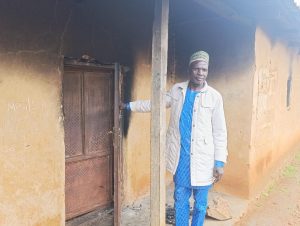
Rev. Davou standing outside his damaged home
He experienced it firsthand. As a result, he now bears the heavy burden of remembering, not just the people he loved, but also the cold, calculated manner in which they were taken away.
“When they got to my house, which is the pastorium of the Church, they started hitting the gate for several minutes before they gained access to the compound,” he told MBT. “We had been hearing all the gunshots, weeping, and screaming from other victims being killed for over an hour. My house was the last they entered.”
You can also read – How Aniebiet Antia Allegedly Scams Investors out of Millions in Akwa Ibom
Rev. Davou Musa’s survival came down to a desperate choice – to hide in a room with goats while his wife and another woman crouched in fear inside a small, outside bathroom. It was a choice that saved their lives.
“One of the attackers came to the room where I was hiding and saw the goats. He was excited, telling his other colleagues he saw some goats in Fulfulde. I understand a bit of Fulfulde, so I heard what he was saying. I believe God saved my life so I can tell the story of what truly happened.”
But perhaps the most chilling part was not what he saw. It was what he heard.
“When it was 5 am, they spoke in Fulfulde that ‘it is 5 am, soldiers,’ meaning they knew exactly when the soldiers would appear in our community. And indeed, a few minutes later, the soldiers came in after over two hours of killings.”
For Rev. Musa, his survival came with a purpose—to bear witness to a horror that was anything but random.
To be continued….

